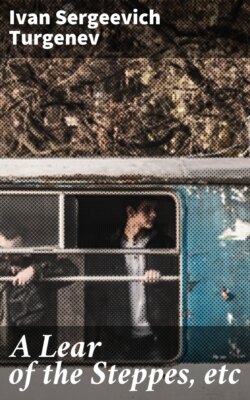Читать книгу A Lear of the Steppes, etc - Ivan Sergeevich Turgenev - Страница 17
На сайте Литреса книга снята с продажи.
VIII
ОглавлениеTable of Contents
I was well acquainted with Harlov’s son-in-law. His name was Vladimir Vassilievitch Sletkin. He was an orphan, brought up by my mother, and the son of a petty official, to whom she had intrusted some business. He had first been placed in the district school, then he had entered the ‘seignorial counting-house,’ then he had been put into the service of the government stores, and, finally, married to the daughter of Martin Petrovitch. My mother used to call him a little Jew, and certainly, with his curly hair, his black eyes always moist, like damson jam, his hook nose, and wide red mouth, he did suggest the Jewish type. But the colour of his skin was white and he was altogether very good-looking. He was of a most obliging temper, so long as his personal advantage was not involved. Then he promptly lost all self-control from greediness, and was moved even to tears. He was ready to whine the whole day long to gain the paltriest trifle; he would remind one a hundred times over of a promise, and be hurt and complain if it were not carried out at once. He liked sauntering about the fields with a gun; and when he happened to get a hare or a wild duck, he would thrust his booty into his game-bag with peculiar zest, saying, ‘Now, you may be as tricky as you like, you won’t escape me! Now you’re mine!’
‘You’ve a good horse,’ he began in his lisping voice, as he assisted me to get into the saddle; ‘I ought to have a horse like that! But where can I get one? I’ve no such luck. If you’d ask your mamma, now—remind her.’
‘Why, has she promised you one?’
‘Promised? No; but I thought that in her great kindness——’
‘You should apply to Martin Petrovitch.’
‘To Martin Petrovitch?’ Sletkin repeated, dwelling on each syllable. ‘To him I’m no better than a worthless page, like Maximka. He keeps a tight hand on us, that he does, and you get nothing from him for all your toil.’
‘Really?’
‘Yes, by God. He’ll say, “My word’s sacred!”—and there, it’s as though he’s chopped it off with an axe. You may beg or not, it’s all one. Besides, Anna Martinovna, my wife, is not in such favour with him as Evlampia Martinovna. O merciful God, bless us and save us!’ he suddenly interrupted himself, flinging up his hands in despair. ‘Look! what’s that? A whole half-rood of oats, our oats, some wretch has gone and cut. The villain! Just see! Thieves! thieves! It’s a true saying, to be sure, don’t trust Eskovo, Beskovo, Erino, and Byelino! (these were the names of four villages near). Ah, ah, what a thing! A rouble and a half’s worth, or, maybe, two roubles’ loss!’
In Sletkin’s voice, one could almost hear sobs. I gave my horse a poke in the ribs and rode away from him.
Sletkin’s ejaculations still reached my hearing, when suddenly at a turn in the road, I came upon the second daughter of Harlov, Evlampia, who had, in the words of Anna Martinovna, gone into the fields to get cornflowers. A thick wreath of those flowers was twined about her head. We exchanged bows in silence. Evlampia, too, was very good-looking; as much so as her sister, though in a different style. She was tall and stoutly built; everything about her was on a large scale: her head, and her feet and hands, and her snow-white teeth, and especially her eyes, prominent, languishing eyes, of the dark blue of glass beads. Everything about her, while still beautiful, had positively a monumental character (she was a true daughter of Martin Petrovitch). She did not, it seemed, know what to do with her massive fair mane, and she had twisted it in three plaits round her head. Her mouth was charming, crimson and fresh as a rose, and as she talked her upper lip was lifted in the middle in a very fascinating way. But there was something wild and almost fierce in the glance of her huge eyes. ‘A free bird, wild Cossack breed,’ so Martin Petrovitch used to speak of her. I was in awe of her. … This stately beauty reminded one of her father.
I rode on a little farther and heard her singing in a strong, even, rather harsh voice, a regular peasant voice; suddenly she ceased. I looked round and from the crest of the hill saw her standing beside Harlov’s son-in-law, facing the rood of oats. The latter was gesticulating and pointing, but she stood without stirring. The sun lighted up her tall figure, and the wreath of cornflowers shone brilliantly blue on her head.
